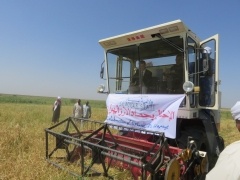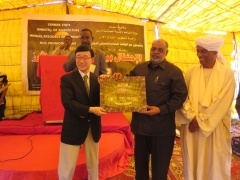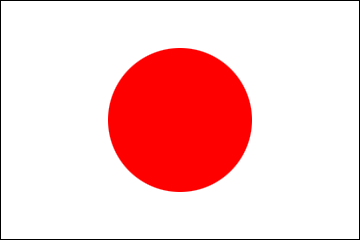Press Release: “Possibilities of exporting rice” - Ambassador of Japan celebrates another Harvest Day to see Sudan’s capacity development in agriculture (Sennar State)
2015/11/15


On the 15th of November, 2015, H.E. Mr. Hideki Ito, the Ambassador of Japan to the Sudan, attended Rice Field Day Celebration at Maiurno South, Sennar State and celebrated upland rice harvest, accompanied by H.E. Mr.Al-Daw Ahmed Al-Mahi, Governor of Sennar State, H.E. Dr. Baha Aldeen Ahmed Alhaj, Minister of Agriculture of Sennar State, Mr. Abu El Gassem Hassan Fadl Allah, Commissioner of Sennar Locality, and other officials and farmers working with JICA.
As Sudan enjoys vast fertile lands and rich water resources, this country has a great potential for agriculture development. Agriculture is considered as one of the most promising economic means and the Government of Sudan has been implementing a number of strategic policies for the improvement of this sector with clear objectives.
Japan’s agricultural project has been featuring production of rice in Sudan as rice has a potential to become an important strategic crop in terms of domestic consumption and export to the neighboring countries. Through “Capacity Building Project for Agricultural Revival”, JICA and Japanese experts have been working together with their Sudanese counterparts for the promotion of upland rice cultivation and the development of the demonstration farms in a number of Sudanese states including Sennar.
During the ceremony, Ambassador Ito said he was pleased to see good harvest results and people’s delight to successful harvest. He encouraged the state and farmers to plant rice as the revenues generated from the plantation of rice are higher than those of the other crops as sorghum and groundnuts. He emphasized through increasing the plantation of rice, the farmers would generate more income; government would reduce the imported rice amounts and one day it would be exported. He hopes that Japan’s contributions will support development of actual people’s lives practically and that will lead to sustainable development of the whole Sudan.
H.E. Dr. Baha Aldeen Ahmed Alhaj has expressed his appreciation for Japan's contributions, praising the Japanese experts who worked in very harsh conditions and temperature that reached to no less than 48 degrees. He hoped to transfer the Japanese experiment to Sudan as Japan was suffering in the past, but now it is among the top countries in the world. He explained his state’s plan to change the cropping pattern and to enroll new crops in their agricultural map in the irrigated and rain-fed areas including rice, sunflower, soybeans and hibiscus and other crops.
As Sudan enjoys vast fertile lands and rich water resources, this country has a great potential for agriculture development. Agriculture is considered as one of the most promising economic means and the Government of Sudan has been implementing a number of strategic policies for the improvement of this sector with clear objectives.
Japan’s agricultural project has been featuring production of rice in Sudan as rice has a potential to become an important strategic crop in terms of domestic consumption and export to the neighboring countries. Through “Capacity Building Project for Agricultural Revival”, JICA and Japanese experts have been working together with their Sudanese counterparts for the promotion of upland rice cultivation and the development of the demonstration farms in a number of Sudanese states including Sennar.
During the ceremony, Ambassador Ito said he was pleased to see good harvest results and people’s delight to successful harvest. He encouraged the state and farmers to plant rice as the revenues generated from the plantation of rice are higher than those of the other crops as sorghum and groundnuts. He emphasized through increasing the plantation of rice, the farmers would generate more income; government would reduce the imported rice amounts and one day it would be exported. He hopes that Japan’s contributions will support development of actual people’s lives practically and that will lead to sustainable development of the whole Sudan.
H.E. Dr. Baha Aldeen Ahmed Alhaj has expressed his appreciation for Japan's contributions, praising the Japanese experts who worked in very harsh conditions and temperature that reached to no less than 48 degrees. He hoped to transfer the Japanese experiment to Sudan as Japan was suffering in the past, but now it is among the top countries in the world. He explained his state’s plan to change the cropping pattern and to enroll new crops in their agricultural map in the irrigated and rain-fed areas including rice, sunflower, soybeans and hibiscus and other crops.
